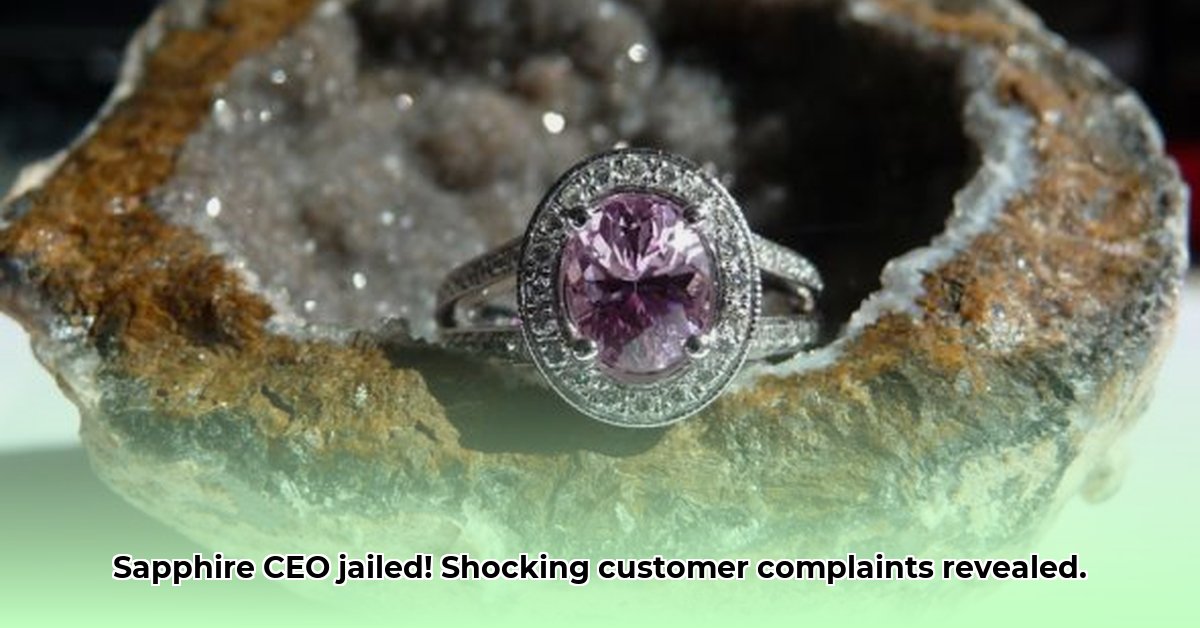
A Gemstone Scandal: The Downfall of the Natural Sapphire Company
The Natural Sapphire Company (NSC), once a prominent online retailer of sapphires, found itself at the center of a major fraud scandal that resulted in the imprisonment of its CEO, Michael Arnstein. This case serves as a cautionary tale about the risks of online shopping and the importance of due diligence when purchasing high-value goods. The story unfolds through a cascade of customer complaints, a protracted legal battle, and ultimately, a criminal conviction. Understanding the details of this case offers invaluable insights into protecting yourself from similar online scams. For more information on similar online scams, see this resource.
A Mountain of Complaints: A Pattern of Deception
The NSC's troubles weren't sparked by isolated incidents; instead, a deluge of customer complaints painted a troubling picture of systemic deception. Numerous customers reported receiving sapphires of significantly lower quality than advertised, often with discrepancies in color, clarity, and carat weight. Many also alleged misrepresentations regarding the stones' origin and overall value. The sheer volume of negative feedback, readily accessible on online forums like PriceScope 1, suggests a deliberate pattern of misleading practices rather than isolated errors. The lack of readily apparent industry certifications further fueled concerns about the company's legitimacy. How many were affected by these deceptive practices remains unknown, but the scale of complaints points to a substantial number of victims.
The Legal Battle: Forged Documents and a CEO's Imprisonment
The situation escalated when Michael Arnstein faced criminal charges related to the fraudulent activities. While initially attempting to shift blame, the prosecution presented strong evidence, including forged court orders allegedly used to suppress negative online reviews. This attempt to silence critics backfired spectacularly, revealing the extent of the deception. Arnstein's subsequent conviction underscored the serious legal consequences of online fraud and served as a stark warning to others. The case highlights the significant penalties associated with such schemes and the potential for severe legal repercussions.
Key Takeaways: Avoiding Online Jewelry Scams
This case offers several critical takeaways for consumers interested in online gemstone purchases:
- Thorough Research is Paramount: Never rely solely on a seller's website for information. Independently verify claims through reputable sources, including online forums and independent gemological laboratories.
- Secure Payment Methods are Essential: Avoid untraceable payment methods like wire transfers. Utilize secure payment gateways that offer buyer protection programs.
- Maintain Comprehensive Documentation: Meticulously document all transactions, including emails, invoices, photos of the product, and screenshots of the website. This documentation provides crucial evidence if disputes arise.
- Seek Expert Assistance When Necessary: If you suspect fraud, consult a lawyer specializing in consumer protection or a qualified gemologist to assess the situation.
How to Avoid Online Jewelry Scams Like the NSC Case
The NSC case highlights several crucial vulnerabilities in online gemstone purchasing. This section delves deeper into specific issues and provides actionable steps to protect yourself:
Mismatched Inventory and Images: A Red Flag
Repeated customer complaints detailed a recurring pattern: sapphires ordered and confirmed were later canceled due to the stone being "already sold," despite remaining listed online. NSC's justification, referencing "identical stones," raised significant concerns. The use of nearly identical product images and stock numbers raises suspicions about the transparency of their inventory management practices. This lack of clarity should be a major warning sign for potential buyers.
The PriceScope Community: A Valuable Source of Information
Online jewelry communities, such as PriceScope 1, played a vital role in exposing the NSC's fraudulent practices. Numerous customer accounts detailed negative experiences, often supported with order details and supporting evidence. These accounts serve as crucial resources for prospective buyers seeking information about the reputation and practices of online retailers.
Risk Mitigation Strategies for Online Gemstone Purchases
The following table summarizes the key risks associated with online gemstone purchases and offers effective mitigation strategies:
| Risk Factor | Risk Level | Mitigation Strategy |
|---|---|---|
| Seller Reputation | High | Thoroughly research the seller; check independent reviews from multiple reliable sources. |
| Product Authenticity | High | Request certificates of authenticity from reputable gemological laboratories; seek independent appraisal. |
| Payment Security | Medium | Utilize secure payment gateways; avoid untraceable payment methods. |
| Misleading Marketing Claims | High | Compare prices and descriptions across multiple vendors; be wary of overly-positive testimonials. |
| Website Security | Medium | Verify website security certificates (HTTPS) and look for established security protocols. |
The NSC scandal emphasizes the critical need for consumer vigilance and proactive due diligence. By heeding these warnings and employing sound risk-mitigation techniques, consumers can significantly reduce their chances of becoming victims of similar online scams. The future of online commerce relies on increased transparency and accountability from sellers and robust consumer protection mechanisms.